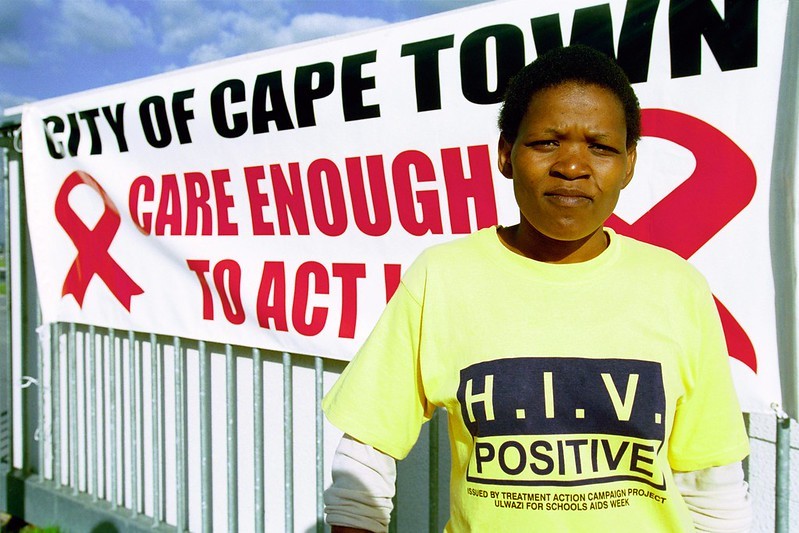World AIDS Day: Celebrating Progress, Confronting the Challenges Ahead
02 December 2024 | Story Natalie Simon | Image World Bank via Flickr Creative COmmons Read time 7 min.
On World AIDS Day, we celebrate the groundbreaking work of UCT researchers in addressing the HIV/AIDS epidemic, showcasing their commitment to equity, innovation, and access to care. While 2024 saw incredible breakthroughs in combatting HIV, particularly the new HIV prevention drug, research has also revealed how much is yet to be done.
There is much to celebrate in the battle against HIV, from the dark days of former President Thabo Mbeki’s AIDS denialism and the resulting block of life-saving anti-retroviral treatment (ART) by the South African government, to having one of the world’s largest ART programmes.
But there is still a long way to go. Southern Africa remains the epicenter of the HIV pandemic. Globally HIV-related illnesses claim approximately 680,000 lives annually, with Africa bearing the brunt of this toll—460,000 deaths each year. HIV continues to rank among the top five causes of mortality on the continent.
Researchers in the Faculty of Health Sciences are at the forefront of global research to better understand the virus, its impact and how healthcare systems can most effectively deliver treatment to ensure people living with HIV can live full and healthy lives.
Promising trial shows possible HIV prevention drug on the horizon
A large clinical trial in South Africa and Uganda has shown that a twice-yearly injection of a new pre-exposure prophylaxis (PrEP) drug gives young women total protection from HIV infection. Professor Linda-Gail Bekker, a physician-scientist in UCT’s Department of Medicine and director of the Desmond Tutu Health Foundation, led the South African leg of the trial.
The trial tested whether the six-month injection of lenacapavir would provide better protection against HIV infection than two other drugs, both daily pills. All three medications are used to prevent HIV infection in at risk individuals.
HIV scientists and activists hope that young people may find that having to make this “prevention decision” only twice a year may reduce unpredictability and barriers.
Further trials may be necessary before this drug is rolled out to the public, but hopes are high the drug will be available in months rather than years.
Behavioural Medicine: Tackling the Intersection of HIV and Mental health Disorders
The HIV Mental Health Research Unit (HIV MHRU), located within the Neuroscience Institute and co-directed by Professors John Joska and Jackie Hoare, conducts research to address one of South Africa's most pressing health challenges: the intersection of HIV and mental disorders.
One-fifth of people with HIV experience mental disorders such as depression, anxiety, or substance use disorders. These conditions may arise due to living with the virus, the associated stressors and stigma, or treatment side effects, and they often overlap with other illnesses like TB, diabetes, and heart disease.
Mental disorder co-morbidity negatively affects HIV care outcomes, including ART adherence, treatment retention, and viral suppression. However, many factors that drive and sustain multimorbidity could be modified through effective treatment, including behaviour change—a central focus of Behavioural Medicine.
Behavioural medicine is a multidisciplinary field that combines behavioural and biomedical knowledge to improve both mental and physical health. Its interventions address key psychosocial and behavioural factors contributing to chronic conditions and illness. For example, the HIV MHRU’s research on cognitive behavioural therapy for depression in people failing first-line ART has shown benefits for both mood and viral outcomes.
In South Africa, where HIV is compounded by multimorbidity and an ageing population, behavioural interventions targeting both physical and mental health remain a critical yet often missing piece. The HIV MHRU is addressing this gap by trialling several behavioural interventions to improve clinical and mental health outcomes in HIV care.
Read more about behavioural medicine and the MHRU.
Why people stop taking their HIV treatment
Stopping ART when you are living with HIV can result in increased HIV transmission, illness, hospitalisation, and eventually death. Recent findings from a study in the Western Cape, conducted by Dr Jonathan Euvrard from the School of Public Health, and colleagues, show that despite the severe implications of disengagement from ART care, a substantial proportion of people on ART go through periods where they stop treatment because of unresolved challenges.
On any given day, about 130 000 people (or a quarter of all people living with HIV in the province) are currently disengaged, having previously been on antiretrovirals. Many of these people do re-engage in care, but after variable time periods, and often only after their clinical condition has deteriorated and they may require hospitalisation.
Reasons for disengagement vary from person to person and can be complex. The researchers argue that more needs to be done to provide differentiated care in which people are treated according to their needs.
Challenging understandings of cognitive impairment of HIV
The cognitive performance of people living with HIV, whose viral load is effectively suppressed by ART, is similar to that of people without HIV. This is the finding of a recent publication by Associate Professor Sam Nightingale, a neurology researcher at the Neuroscience Institute, and colleagues. This latest finding builds on a body of work by Nightingale challenging global criteria for cognitive impairment in people living with HIV. His work has shown how this global criteria overestimates prevalence of HIV by failing to take into account socioeconomic and other non-HIV factors. Nightingale’s work has had global impact working towards better support for those that need it and avoiding inappropriate diagnostic labels.
Read more about this research.
These studies remind us that while progress is cause for celebration, the fight against HIV/AIDS demands unwavering commitment to equity, access, and innovation.
 This work is licensed under a Creative Commons Attribution-NoDerivatives 4.0 International License.
This work is licensed under a Creative Commons Attribution-NoDerivatives 4.0 International License.
Please view the republishing articles page for more information.










